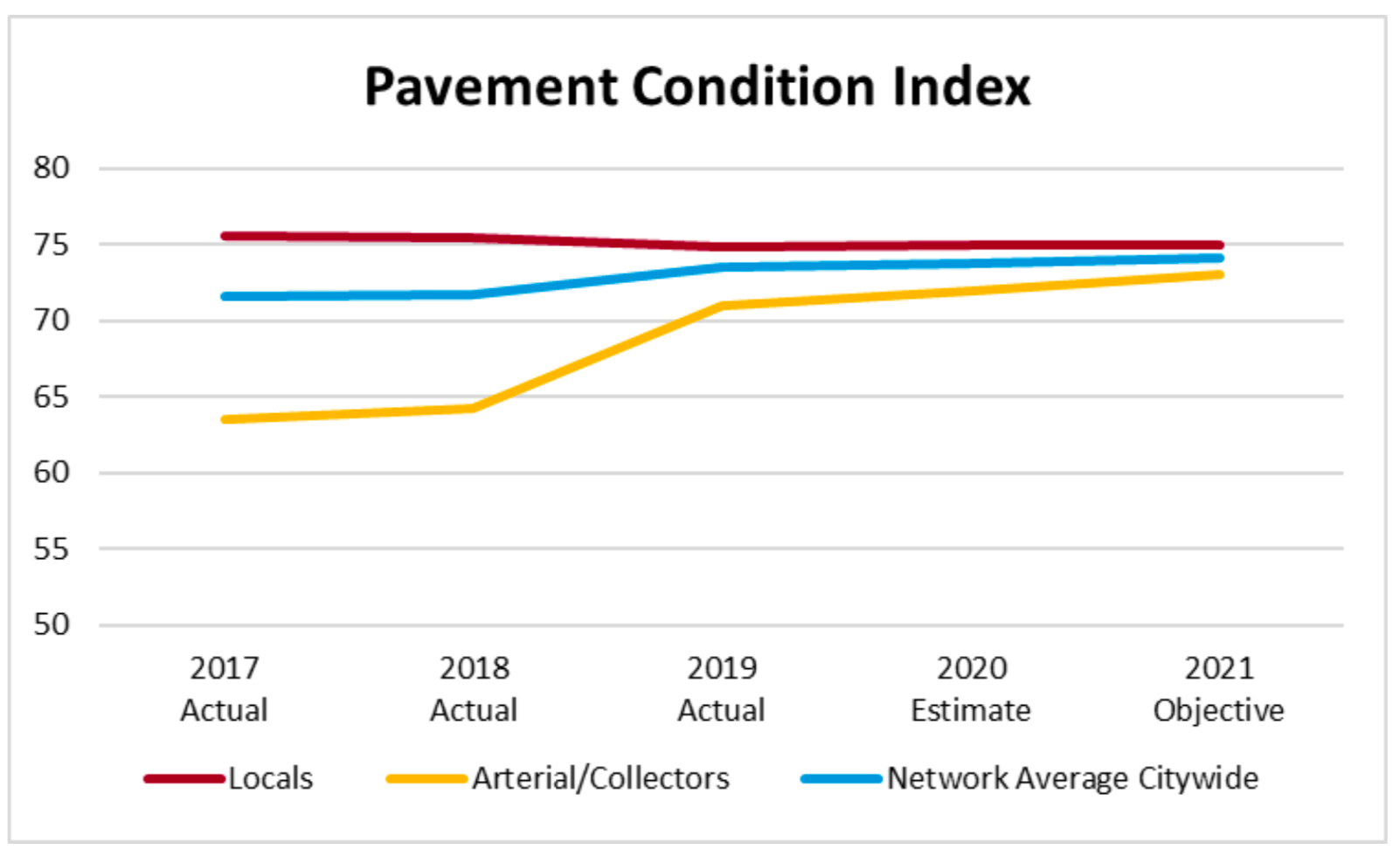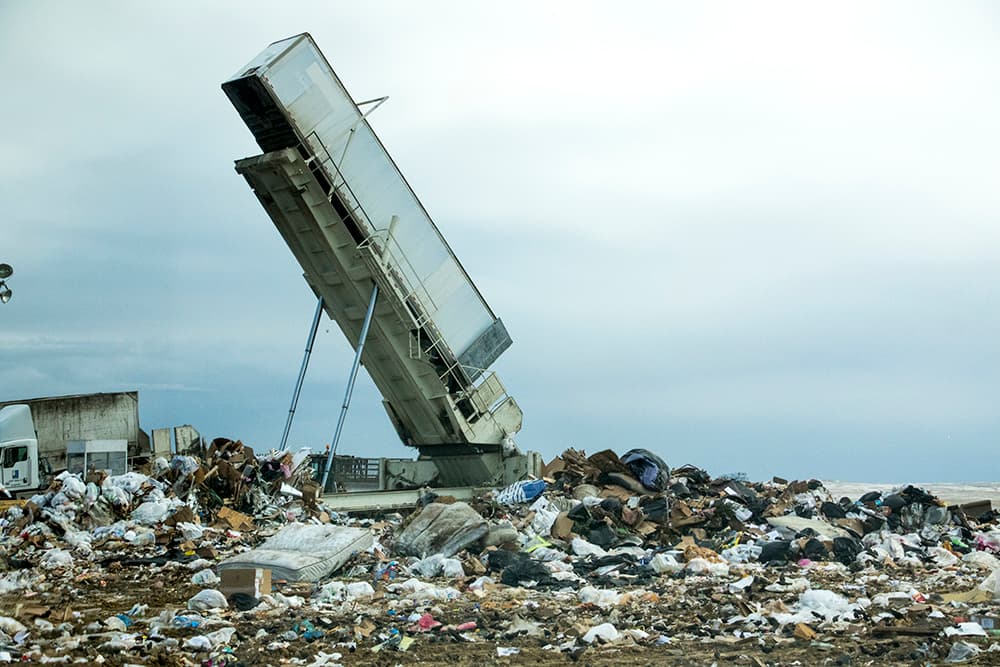The thing about a historic pandemic is that people spend historically low amounts of money in our city. Staying in has replaced going out. Would-be urban tourists are staying in Texas. And a government that depends on sales and tourism taxes is cutting spending on things we're accustomed to having. What are those things? We'll go through each pocket of the city to find out.
The Department of Transportation and Infrastructure maintains streets -- paves, plows, fixes and cleans them -- and builds new things like sidewalks and bike lanes. DOTI, formerly known as public works, also hauls off our trash, recycling and compost, among other basic city services.
Those things don't happen magically; they require money and people. And DOTI has less money and fewer people these days because of tax dollars that never came. Budget cuts mean the department will have nearly 100 fewer staffers than expected in 2021, according to budget documents. That's thanks to a combination of early retirements for employees with over 1,000 years of institutional knowledge combined and vacant posts that will go unfilled. Current city workers will take on the duties of retirees, officials said.
DOTI will still have about $128 million from the city's main bank account to work with next year, over $21 million less than its allocation for 2020, according to the budget. A lot of those cuts will be felt by city workers -- overtime, training, travel, new computers, tools and vehicles will take a hit -- but not so much by city dwellers.
"With the posture we've been in for the past year, we are set up to still deliver on all the projects, programs and services in 2021," DOTI Executive Director Eulois Cleckley said. "And we'll just absorb what those demands look like."
So how does less money translate to changes in your life?
Get ready for fewer big-trash pickups and a delay to the city's universal composting program.
Typically, the city's solid waste arm picks up oversized trash items like couches every four weeks. But this year, the city cut those pickups back to every eight weeks. That change will stay in effect for 2021.
At times, garbage trucks have hauled away 30 percent more trash, recycling and compost than usual lately because people are at home more, Margaret Medellin, who leads the department's solid waste division, told city council members. But she added that drivers haven't missed a beat on regular pickups.
DOTI will also delay the implementation of its "pay-as-you-throw" program, a sustainability initiative meant to fight climate change that would charge residents for trash pickup while making composting free. Mayor Michael Hancock first considered the program in 2011 and committed to getting it done this year. But Cleckley said now is not the time to charge people extra money.
"The circumstances are as such where we want to be sensitive to the people that live here in the city," Cleckley said. "And of course, at a time where everybody's burdened financially because of COVID, we don't want to make a policy change that's going to increase that burden."
You'll experience fewer newly-paved streets.
With 17 fewer workers on the street maintenance team, locals will see about 465 miles of lanes paved in 2021. That's about the same mileage as 2018, according to DOTI. But it's far less than the 579 miles paved this year.

While in 2019 it took crews an average of almost four days to fix potholes after they were reported, DOTI's goal is to get that number down to three next year because of fewer drivers and therefore less stress on the streets this year.
The city insists it is ready, willing and able to plow snow like it always does.
Todd Richardson, DOTI's head of operations, told council members that the city's residential street and bike lane plowing programs are "at risk."
"Every year, snow removal is a challenge for us," Richardson said. "This year, with the reductions in overtime and some of the hiring freezes, that is going to be even a bigger challenge."
But Cleckley downplayed that assertion, saying there's always a risk, depending on the level of snow and employee attrition. DOTI's chief financial officer Seth Runkle said the city is fully prepared to handle major snowstorms because the department has trained other staffers to plow. That includes people from the parking enforcement and Parks and Rec departments. Denver will have two full shifts of 60 to 70 plows, which is typical, and the option to add a third if necessary, he said.
"So we're feeling fairly good about maintaining at least the levels that we have, if not improving," Runkle said.
Less street-cleaning downtown.
DOTI will cut back on street-sweeping in the Central Business District, but there's also less wear and tear with less foot and vehicle traffic lately.
"These decisions are difficult," Richardson said. "We take pride in the way that the city looks, and we especially want our Central Business District to remain clean."
Wait a second... how does DOTI lose tens of millions of dollars with little effect on the public?
DOTI says capital projects, like sidewalk and bike lane construction, won't suffer and that approving permits for things being built in the right of way -- 5G poles, restaurant railings and so on -- hasn't slowed. Cleckley points to the reason he was hired, which he said was to turn public works into a transportation-first department. Part of that job included making its many, many, many functions more efficient.
"The past two-and-a-half years of work with the reorganization has prepared us for this moment," Cleckley said.
Also, the department thinks city workers can do more with less.
"Sometimes these times really force you to look inward and say, 'How can we deliver the best service at the lowest cost?" said Runkle, the CFO. "That's the business that we're in. It can be a little easier, when the coffers are flush, to deliver at a very high level. But it doesn't necessarily always mean that you're doing it at the most efficient level."
Still, doing more with less is not sustainable forever.
"This also is a reflection of the staff and their work ethic. Folks have been working their butts off since February and have not had a break," Cleckley said. "We know that they're overtaxed and the workload has increased, and they've still been able to deliver. That can't happen in perpetuity. So at some point, there will be potentially an impact on productivity."












